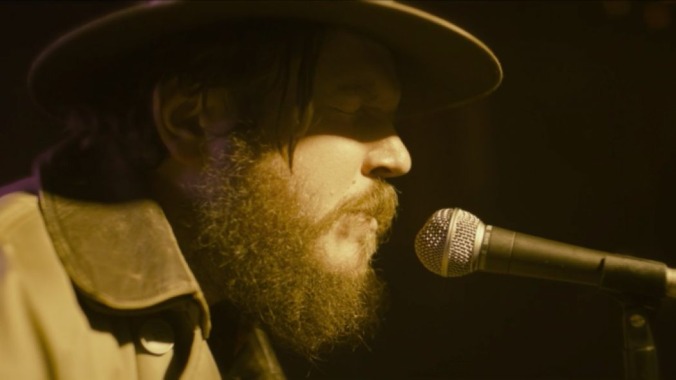Ethan Hawke introduces an unsung country renegade in the intimate biopic Blaze
Film Reviews Movie Review
Of the many challenges writer-director Ethan Hawke dealt himself in dramatizing the life of unsung country musician Blaze Foley, the biggest of them is simply justifying the exercise. Foley wasn’t a household name, at least for anyone who didn’t grow up behind a Texarkana dive bar, and his discography is limited to a batch of 45s and live albums recorded during his note-for-note rendition of a debauched musician’s decline. He died violently at just 39 years old, the cruel result of a good deed duly punished, following an oddball life that sounds at times like a campfire legend rather than an accounting of actual events.
Perhaps that’s why Blaze feels like a true passion project, an engine running on Hawke’s endless supply of enthusiasm for his subject. As if to mock himself for arriving late to Foley’s music, Hawke appears in a voice cameo playing a public radio host so obtuse he commits the “folly” of mispronouncing Foley’s last name. He’s not only palpably enamored with his subject, he’s indignant about Foley’s obscurity. Audiences might not fall in love with Foley or his music by the end of the film, but they’ll be damn sure Hawke thinks it’s too bad they hadn’t heard of Foley sooner.
Hawke’s fascination is understandable, based solely on “Clay Pigeons”—Foley’s wistful signature song, and the one that inspired Hawke to learn more about his life. As performed by Ben Dickey, a talented singer-songwriter making his acting debut, the tune carries with it every bit of the regret and restlessness Foley intended. Blaze couldn’t have possibly worked if not for Dickey, whose musicianship, physicality, and pedigree make him so well-suited to the title role, it’s hard to imagine another actor playing Blaze—even a more seasoned one. But beyond his natural advantages, Dickey delivers a mighty roar of a debut performance, one he could easily parlay into a full-time gig.
Blaze is formally introduced in the radio interview between Hawke’s uninitiated host and a pair of Foley’s contemporaries, Townes Van Zandt (Charlie Sexton) and Zee (Josh Hamilton). From there, Hawke hopscotches between time periods for a triptych encompassing Townes’ and Zee’s whiskey-soaked anecdotes, Blaze’s self-destructive final days, and his star-crossed love affair with aspiring actress Sybil Rosen (a perfectly cast Alia Shawkat). The radio interview is music biopic by rote, with Townes and Zee heaping exposition about Foley’s life and playing his deep cuts. But it’s a necessary evil. The other threads of Blaze are more whimsical and dream-like, owing both to the frenetic montages that come when Blaze appears deep in thought and cinematographer Steve Cosens’ autumn-hued aesthetic. The approach is most potent in the period when Blaze and Sybil, who meet-cute at an artists’ commune, move into a rustic but spacious treehouse in the Georgia wilderness.
It’s during the treehouse phase when Blaze is most affecting, in part because the scenes are drawn from a poignant memoir written by Rosen, with whom Hawke crafted the screenplay. Dickey and Shawkat’s easy chemistry makes Blaze and Sybil’s move to the forest seem perfectly reasonable. Up in the treehouse, Blaze and Sybil disappear further into each other as the demands of the real world seem less urgent by the day. But their carefree days of forest frolic and spontaneous harmonies are tinged with anxiety, as they try in vain to encourage each other’s artistic passions. The more content they become in their treehouse cocoon, the more anxious they become about what they’re missing down on the ground. So the pair leaves the nest in favor of Austin, a move prompted by Blaze’s musical ambitions and his general wanderlust, as well as the inevitable ennui to be expected of an open-ended honeymoon cabin trip.
Blaze and Sybil’s relocation hastens the end of their relationship as Blaze immerses himself in Austin’s bar culture and experiments with habits even needier than his alcoholism. The film becomes much more conventional as Foley’s life slowly begins to resemble a shopworn rock-’n’-roll cautionary tale. But by the time Blaze settles into a familiar groove, Hawke has already made a convincing case for why Foley’s story deserved the silver-screen treatment in the first place. As should be expected from a forebear of country music’s renegade spirit, Foley is a whirling dervish whose life would probably have been as interesting had he never taken up his craft. Foley’s music certainly deserves a wider platform, but with Blaze, Hawke has created a character study engrossing enough to make the man as layered and complex as the songs he churned out.